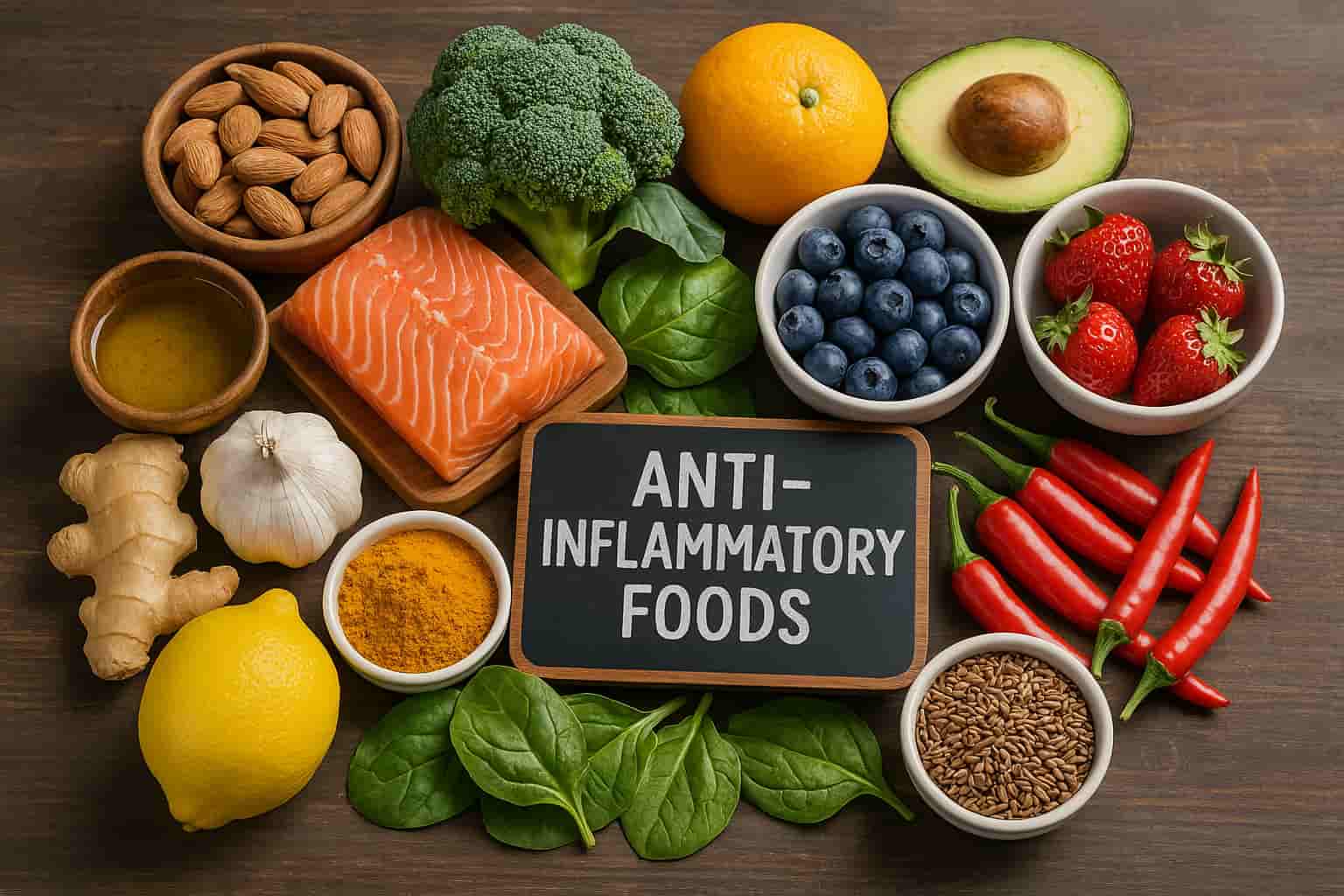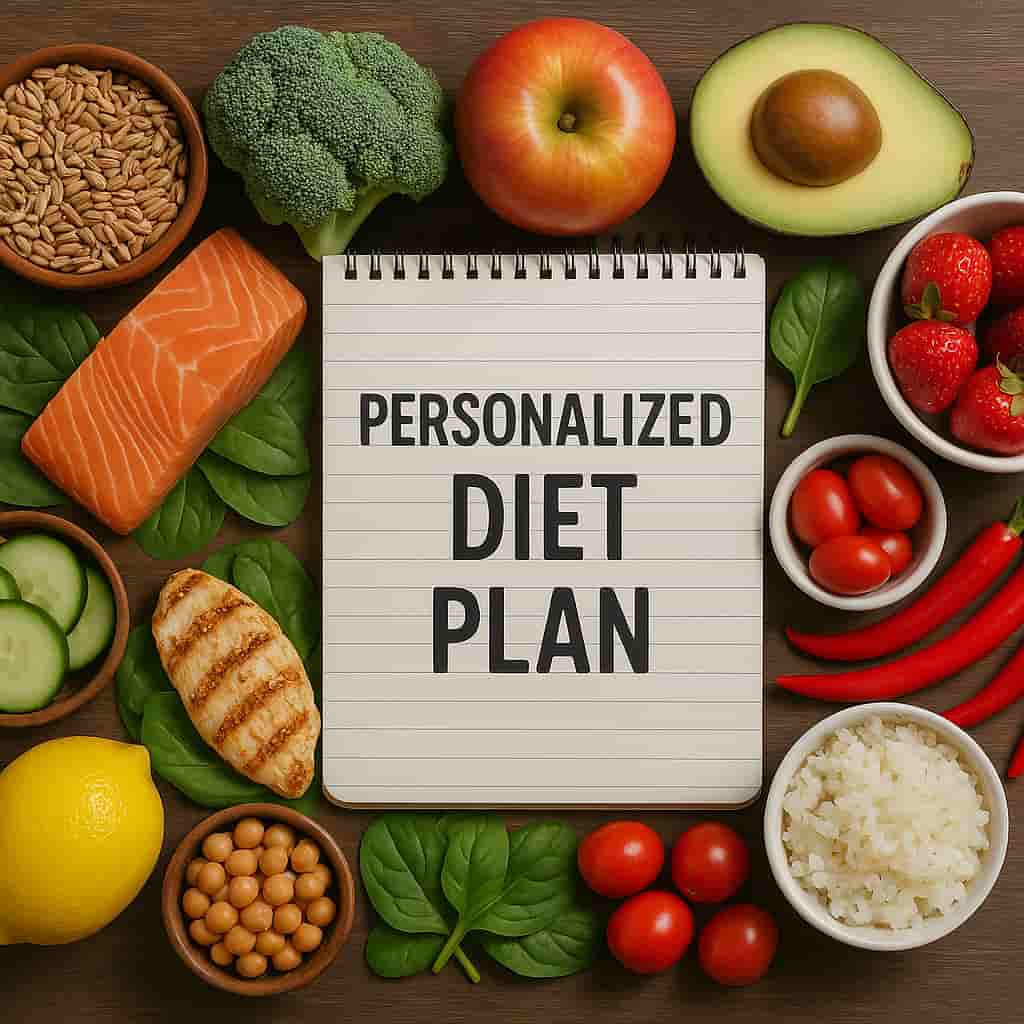Personalized Anti-Inflammatory Diet Plan
Discover a dietary approach tailored to your unique health needs and lifestyle, designed to soothe inflammation and boost your overall well-being.

Ready to Transform Your Health?
Take a quick assessment to get customized dietary recommendations based on your conditions, preferences, and lifestyle.
Why This Tool Matters for Your Health
This innovative tool combines scientific data with personalized factors to help you build a customized anti-inflammatory diet plan, reduce inflammation, and enhance your overall well-being.
Personalized for Your Unique Needs
Your health is unique. Our tool considers your specific medical conditions, dietary preferences (like vegan or gluten-free), and lifestyle factors (activity, smoking, sleep) to craft a diet plan that's truly yours.


Comprehensive Food & Lifestyle Guidance
Get clear recommendations on foods to include for their anti-inflammatory properties and foods to limit that may contribute to inflammation. We also provide practical tips for integrating these changes into your daily life.
Understanding Inflammation Symptoms & Targeted Relief
Chronic inflammation can manifest in various ways. Understanding common symptoms and how diet plays a role can empower you to make informed choices.
joint pain
Foods rich in omega-3 fatty acids and antioxidants (like vitamins C and E) can help reduce joint inflammation. Avoiding sugar and trans fats lowers inflammatory mediators.
- Added sugars and sodas
- Refined carbohydrates (white bread, pastries)
- Processed and red meats
- Deep-fried foods
- Fatty fish (omega-3)
- Leafy green vegetables
- Berries and cherries
- Nuts and seeds
- Turmeric and ginger
skin redness
Vitamin C and beta-carotene (in fruits and vegetables) support skin repair and reduce inflammation; antioxidants (polyphenols) help calm skin redness.
- Dairy milk
- Spicy foods
- High-glycemic sweets
- Alcohol
- Citrus fruits and bell peppers (vitamin C)
- Tomatoes and carrots (vitamins A/C)
- Green tea (antioxidants)
- Omega-3 rich foods (fish, flaxseeds)
fatigue
Complex carbs and proteins provide steady energy; B vitamins and iron (in whole grains and greens) combat fatigue; hydration is key for overall energy.
- Added sugars
- Caffeine (excess)
- Highly processed snacks
- Complex carbohydrates (whole grains)
- Leafy greens (B-vitamins, iron)
- Lean protein (eggs, legumes)
- Hydrating foods (water-rich fruits)
brain fog
Antioxidants and omega-3 fatty acids support brain function and reduce cognitive fog; vitamins like B12 and folate aid neurotransmitter production.
- Refined sugar
- High-fat fast foods
- Alcohol
- Berries (antioxidants)
- Leafy greens (folate, vitamin K)
- Omega-3 rich foods (fish, walnuts)
- Hydration (water, herbal tea)
bloating
Probiotics and soluble fiber support digestion and reduce gas; herbal teas like ginger soothe the gut and alleviate bloating.
- Beans and lentils (in excess)
- Cruciferous vegetables (broccoli, cabbage)
- Carbonated drinks
- Sugar alcohols (sorbitol)
- Probiotic yogurt or kefir
- Low-FODMAP fruits (banana, berries)
- Ginger or peppermint tea
- Oats and flaxseed (soluble fiber)
headaches
Magnesium and B vitamins help maintain healthy blood vessels and nerve function, potentially preventing headache triggers.
- Aged cheeses (tyramine)
- Cured meats (nitrates)
- MSG-containing foods
- Excess caffeine
- Magnesium-rich foods (almonds, spinach)
- Hydrating fluids (water)
- B-vitamins (whole grains, eggs)
- Anti-inflammatory spices (ginger)
muscle soreness
Protein aids muscle repair; antioxidants and bromelain (in pineapples) may reduce inflammation; electrolytes and magnesium help recovery.
- Alcohol
- Highly processed carbs
- Sugary drinks
- Lean protein (chicken, tofu)
- Fruits like cherries or pineapple (antioxidants, bromelain)
- Hydration (electrolyte fluids)
- Leafy greens (magnesium)
swelling
Potassium and hydration help balance fluid retention; antioxidants and healthy fats reduce systemic inflammation and edema.
- Excess salt (sodium)
- Refined carbohydrates
- Processed foods
- Potassium-rich foods (bananas, sweet potatoes)
- Antioxidant-rich fruits (berries)
- Hydrating cucumbers and watermelon
- Anti-inflammatory fats (olive oil)
Holistic Benefits for a Healthier You
By following a personalized anti-inflammatory diet, you can work towards reducing chronic inflammation, alleviating related symptoms, boosting energy levels, and fostering long-term wellness and vitality.
Disclaimer: This tool provides general dietary guidance based on information provided. It is not a substitute for professional medical advice, diagnosis, or treatment. Always consult with a qualified healthcare professional or registered dietitian before making any changes to your diet or health regimen, especially if you have existing medical conditions.
Explore More Health & Wellness Tools
Deepen your understanding of your health with our other specialized calculators and insightful tools designed to support your well-being journey.
Frequently Asked Questions
Find clear answers to common questions about anti-inflammatory diets and how our tool can support your journey to better health.
- What exactly is an anti-inflammatory diet?
- How does this tool personalize my diet recommendations?
- Is this tool a substitute for professional medical advice?
- What types of foods are recommended in an anti-inflammatory diet?
- What foods should I limit or avoid on an anti-inflammatory diet?
- Can I use this tool if I have allergies or specific dietary restrictions?
- How quickly can I expect to see results from following an anti-inflammatory diet?